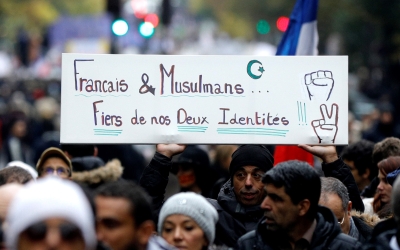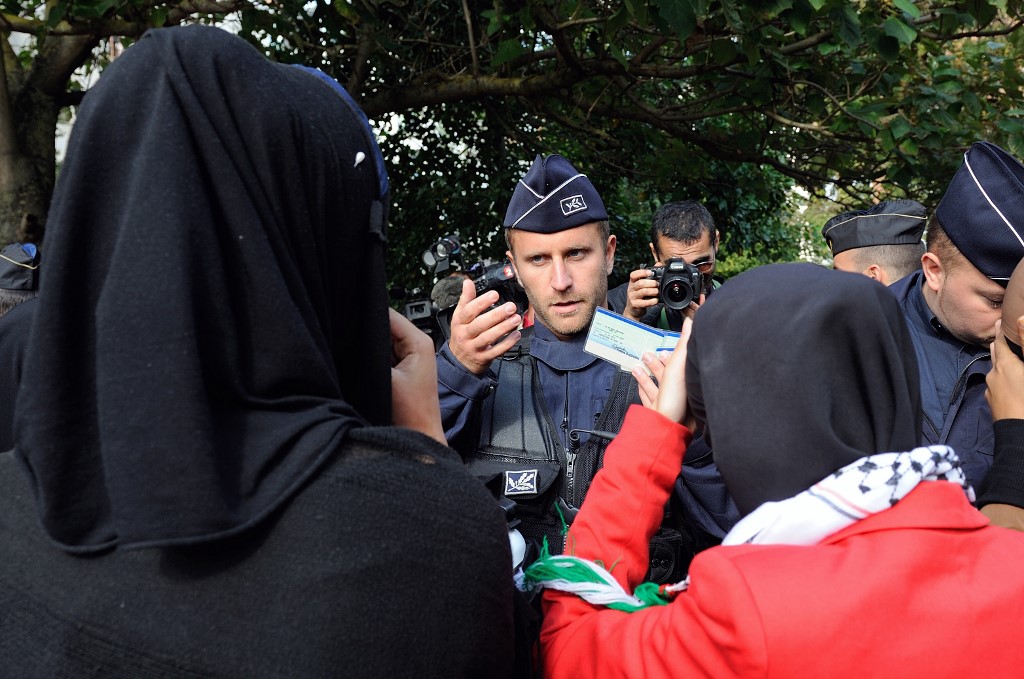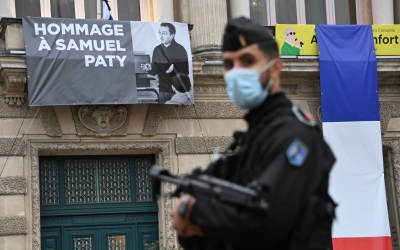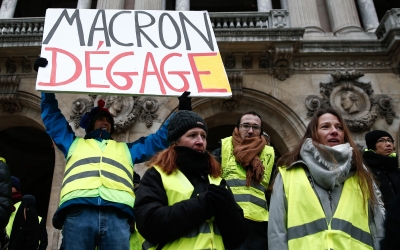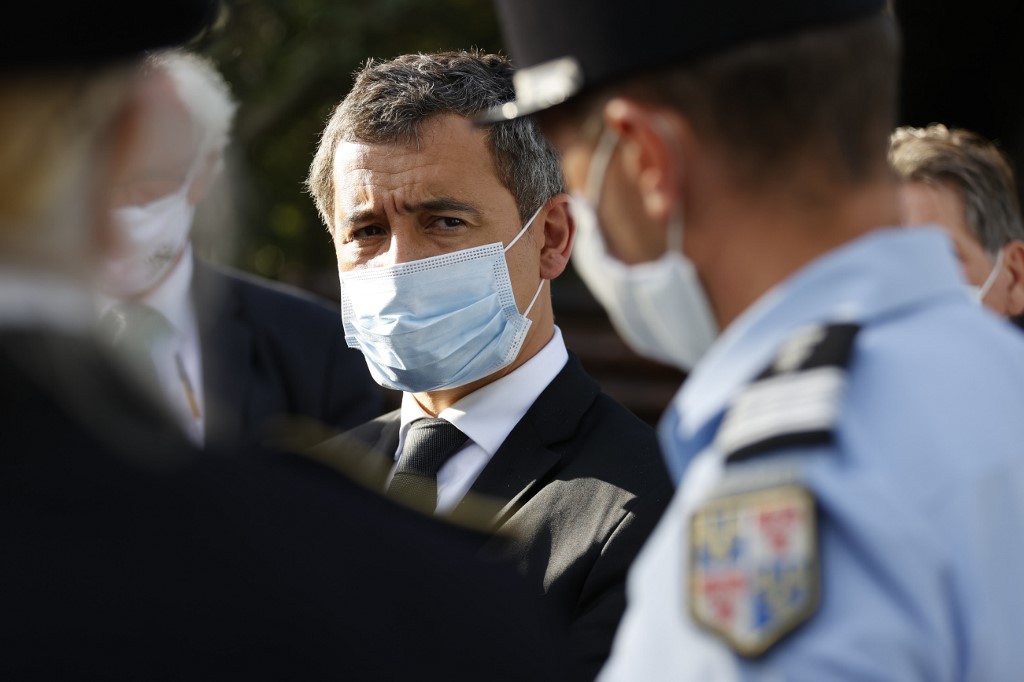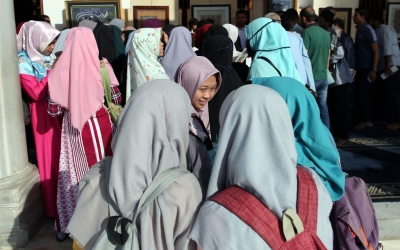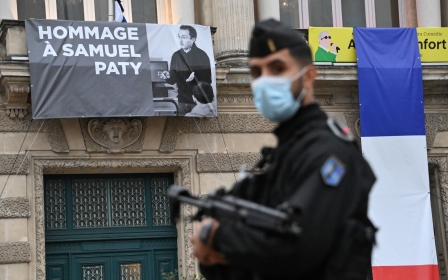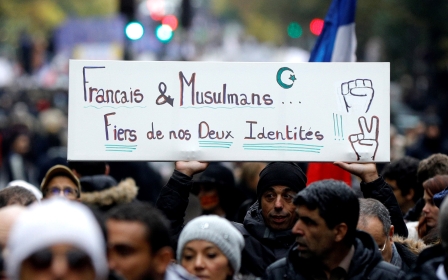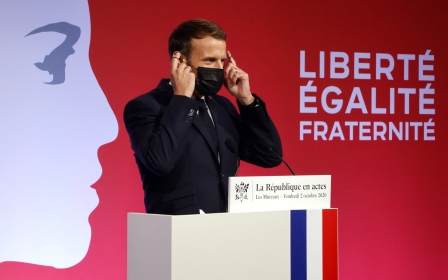Samuel Paty murder: France’s Muslim community first to bear brunt of iron-handed measures
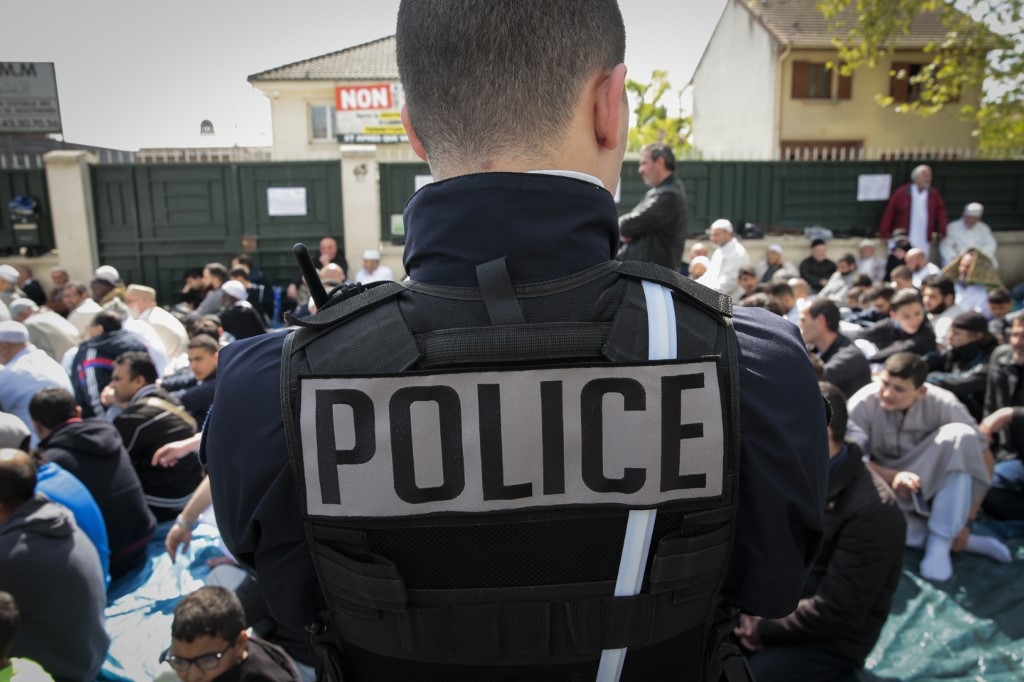
The response was swift. Following the brutal murder of teacher Samuel Paty on 16 October, French Interior Minister Gerald Darmanin announced his intention to shut down the Collective against Islamophobia in France (CCIF) as well as BarakaCity, a Muslim humanitarian non-profit organisation.
Former MP Barbara Romagnan reacted on Twitter: “Until proven otherwise, the CCIF has nothing to do with this. Shutting down an organisation that gives a voice to those who feel discriminated against does not fight terrorism…”
Only a handful of political figures have dared point out that the nation’s highly charged emotions could seriously jeopardise civil liberties. Since the beginning of October, Islamic spaces have fallen prey to an increasing number of police searches across France, including the Omar mosque in Paris, on 3 October; shortly thereafter, two schools and a funeral home.
It was enough to worry France’s Muslim leadership. Around 30 Muslim religious leaders from the greater Paris region sent an open letter to the French president to “express [their] concerns about the increasingly harmful treatment of Islam and Muslims in our country”.
A young mother from the Paris suburbs, contacted by Middle East Eye via phone, sighed. She witnessed one such police search in 2018, at a community centre in the Val-de-Marne department.
“We were with our kids when about 20 police agents arrived. They separated us and asked us questions," she said. "They wanted us to say that it was a secret school, which it was not. We just met there from time to time, among mothers. Some of us homeschool our children.”
When the police search turned up nothing, the centre continued its various charity activities - but stopped working with children. “[The police search] left a bad taste, a feeling of stigma, and the children are afraid,” she said.
The French government is pushing for the adoption of a bill to fight radicalisation, the outlines of which are still unclear. The draft bill, which stipulates increased inspections of organisations offering Arabic lessons or tutoring, will be presented to the Council of Ministers in December.
What is clear is that the bill targets “Islamist separatism” in particular, to quote President Emmanuel Macron. The topic has been a main focus of media attention since the start of the school year.
Resorting to ‘ruse’
“There is no denying that we are afraid,” Sihem Zine of Action for the Rights of Muslims (ADM) told MEE.
The new bill aims to expand a set of repressive measures that have already been used extensively in recent years. Between 2012 and 2017, at least nine additional anti-terrorism laws reinforced France’s criminal and administrative arsenal.
'There is no denying that we are afraid'
- Sihem Zine, Action for the Rights of Muslims
At the end of 2017, provisions previously reserved exclusively for the state of emergency put in place following the November 2015 attacks in Paris, which expired in November 2017, were incorporated into ordinary law. On the grounds of mere suspicion, police chiefs and the minister of interior can now order house arrests, administrative searches and closures of places of worship.
November 2019 marked a further development when the Ministry of the Interior issued a circular urging the use of administrative measures to repress questionable places and organisations.
Then-Interior Minister Christophe Castaner sent a clear message to police chiefs.
“The moment you have doubts about a place or an organisation, I ask you not to hesitate to carry out inspections and checks," Castaner said. "And if any problems are identified, carry out administrative closures without hesitation.”
According to lawyer William Bourdon, “it’s a diversion: they’re using administrative measures, ostensibly in the fight against radicalisation, while in fact pursuing their own objectives, such as ensuring compliance with the rules of ‘hygiene’”.
A case in point: the police raid on the Omar mosque in Paris on 3 October involved at least 15 police agents “to note simple breaches of fire safety standards”, tweeted MP Alexis Corbiere.
Zine sees this as an attack on the principles of law. “Authorities go through administrative channels to bypass the judiciary, which allows them to better defend themselves,” she said.
The Minister Delegate to the Minister of the Interior Marlene Schiappa made no secret of this approach on the airwaves. “The state must resort to ruse,” in its fight against separatism, she said on 2 October.
According to Schiappa, no fewer than 210 bars, 15 places of worship, 12 cultural and community centres and four schools have been closed through administrative measures over the past two years.
Since 2015, between the state of emergency, the adoption of the 2017 law extending some of its measures and the issuance of the Castaner circular, thousands of citizens and organisations have been the targets of home arrests, police searches and seizures of documents.
Were these acts warranted? In 2017, the French Council of State found that nearly 40 percent of the repressive measures taken in the context of the state of emergency that were contested before an administrative court were deemed illegal.
“But often, the damage is done,” explained lawyer Besma Maghrebi to MEE. “When the police visit a community centre, a restaurant, or a mosque, the establishment’s reputation will inevitably suffer. Likewise, a citizen under house arrest is necessarily marginalised.”
A system based on suspicion
Public prosecution is now guided in large part, it seems, by suspicions, says Maghrebi, who works as a defence attorney representing individuals, including imams, as well as non-profit organisations.
“Various anti-terrorism laws and circulars have resulted in the widespread application of administrative and judicial measures on the basis of mere suspicion,' she explained. "This poses a very clear legal problem.”
Suspicions of radicalisation often stem from the intelligence services, whose role has become central.
'In the space of just a few months, without any credible facts, they flag you as radicalised. But then it takes years to prove the contrary'
- 'F', a Muslim civil servant
“The ‘white notes’ of the DGSI [General Directorate for Internal Security], which are documents often lacking even a date, header or signature, are the basis of a large number of recent actions taken by the authorities,” said Zine.
In a 2020 memo, the National Consultative Commission for Human Rights (CNCDH) agreed. “These measures, which are particularly restrictive of fundamental freedoms, are in fact based on suspicions backed to varying degrees by the information provided by the [white notes of the] DGSI,” it said.
“There is a very real danger in police action based on evidence supposedly meeting the definition of a ‘radicalised Muslim’: many citizens may find themselves in this category,” said Maghrebi.
As a result, dozens of citizens in France are paying the price of hasty flagging based on what is sometimes weak and stigmatising evidence.
One such citizen, a Muslim civil servant named F, is exhausted. “I try to be positive, but at one point in my life, I couldn't take it anymore. I was at the end of my rope, I was thinking the worst,” he told MEE.
His life turned upside down in 2015, when his management summoned him. The reason cited was his beard. “It wasn’t so different from the beards of other fashionable colleagues,” he said.
It was the start of an unbelievable ordeal. Although F had passed the national tax agent exam, he was denied work; a document, whose authors were kept from him, stated that he was radicalised. A perfectly law-abiding citizen discovered that he had been flagged with an “S file” - an indicator used by French law enforcement to highlight individuals considered to pose a serious threat to national security.
F’s name has since been cleared in court, but his career advancement remains stalled all the same.
He told MEE that “in the space of just a few months, without any credible facts, they flag you as radicalised. But then it takes years to prove the contrary”.
In the meantime, his life has changed: “You’re surrounded by suspicion, people become distant. And you have to pay the legal fees… .”
Undefined ‘radicalisation’
F condemned the “atmosphere of inquisition” and comments on the prevailing political discourse from the perspective of his personal situation. “I was counted among those ‘dangerous individuals’ in the figures presented every night on TV," he said. "I was included among those ‘radicalised civil servants’ even though I am nothing of the kind. It's unbearable.”
In his book, Enemies of the State, the lawyer Raphael Kempf analysed the mechanism in which, “through a chain of procedures, the judicialisation of a mere suspicion is sufficient to establish a crime”.
In recent years, French citizens have been sent behind bars for non-compliance with various administrative obligations ordered by the Ministry of the Interior, such as checking in at a police station.
The notion of “radicalisation” itself is still very unclear, despite the fact that it informs decisions to prosecute.
Yasser Louati, a member of the Justice and Freedoms Committee for All (CJL), remarked that “the term has not been defined”.
“A 2017 Senate report pointed out that even local elected officials questioned the concept,” he said. “There is widespread lack of clarity on the matter, even as very real action is being taken on the basis of this term.”
The CNCDH warned in 2017 that “the matter of ‘radicalisation’, which has become a primary objective in public policy […], is an elusive concept, neither solid nor proven”.
Under the pretence of searching for signs of radicalisation, is the Ministry of the Interior cracking down on mere religious affiliation? It has already cited the presence of classical religious texts seized during searches as justification for the closure of places of worship.
The Gardens of the Righteous, a collection of hadiths compiled by Imam al-Nawawi in the 12th century, was cited to help justify the closures of at least two mosques, in the towns of Haumont and Sartrouville, due to passages of the book devoted to jihad - which can refer to the personal struggle of a believer against evil and persecution, or a holy war by Muslims in defence of the Islamic faith.
“You can’t help but notice that these ‘white notes’ sometimes cite religious practices that are in fact quite common,” explained a lawyer with experience in such cases, speaking to MEE on the condition of anonymity.
Since 2014, there has also been a harsher crackdown on the offence of “incitement to terrorism”.
NGOs such as Amnesty International have expressed growing concern since 2015 about the increase in court appearances for “incitement”, “an offence whose definition remains vague” and which could “be used to criminalise remarks made without the requirement of proving intent, a necessary criterion in defining an offence”.
Beyond the Muslim community
“These arrests create a high risk for free speech violations,” warned Amnesty International. In addition to jailing teenagers, intoxicated individuals, or those appearing to suffer from psychiatric disorders, the “incitement” offence runs the clear risk of criminalising opinions.
As he recounts in his book, Kempf defended a Parisian father, accused in 2015 of having displayed an Islamic State (IS) flag on his windows. It was in fact a religious symbol, a protective talisman. This man narrowly avoided incarceration, was placed under judicial supervision and “was unable to prove his innocence until after nearly two years of proceedings”.
In attacking the Muslim community and its faith-based organisations, the state is chipping away at public freedoms. On 10 June 2019, French bank BNP closed the bank account of organisation Action for the Rights of Muslims (ADM). The bank's lawyers acknowledged the involvement of a third party. It was “probably the intelligence services”, according to the Observatory of Associative Freedoms.
Many intellectuals, political movements and NGOs have pointed out the increasing authoritarianism within French democracy. In light of the increased restrictions on freedom of association and the growing repression of social movements, voices from the Muslim community are sounding the alarm. According to ADM, “at the beginning, these administrative measures focused only on Muslims, but today they extend naturally to the rest of society”.
In August, Darmanin, the interior minister, explained that the anti-separatism bill would target not only Muslims, but also “sectarian abuses” as well as “parts of the ultra-left” and “white supremacists”.
Sociologist Hamza Esmili studies counterterrorism strategies. If public action is fueled by an Islamophobic approach, then “it is difficult to imagine the state preventing itself from drawing on its repressive arsenal to target other opponents, such as environmentalists", he told MEE.
In September, a young engineer from the National Centre for Space Studies was fired on the basis of two lines of text in another “white note” memo from the DGSI, according to which he had been in contact with the ultra-left. An all-too familiar situation for many Muslim families.
This article is an edited translation of a story originally published on Middle East Eye's French website
Middle East Eye delivers independent and unrivalled coverage and analysis of the Middle East, North Africa and beyond. To learn more about republishing this content and the associated fees, please fill out this form. More about MEE can be found here.


